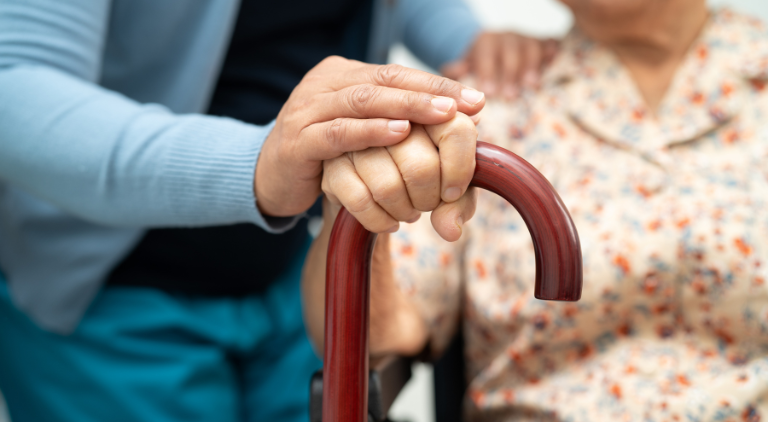
Caregiver burnout occurs when the stress and responsibilities of caring for a loved one overwhelm the caregiver, leaving them feeling drained, hopeless, and unable to continue providing care effectively. This condition doesn’t happen overnight; it builds gradually as caregivers prioritize their loved ones’ needs over their own, often neglecting their health, relationships, and emotional well-being.
Signs and Symptoms of Caregiver Burnout
Caregivers often miss the early signs of burnout because they are so focused on their duties. Here are some key indicators of burnout to watch for:
Physical Symptoms
- Chronic fatigue and exhaustion, even after resting.
- Frequent headaches, body aches, or other unexplained health issues.
- Changes in appetite lead to weight gain or loss.
- Difficulty sleeping or insomnia.
Emotional Symptoms
- Feeling overwhelmed or constantly worried.
- Increased irritability or impatience.
- Losing interest in activities or hobbies that once brought joy.
- Experiencing feelings of hopelessness, guilt, or self-doubt.
- Signs of depression or anxiety.
Behavioral Symptoms
- Withdrawing from family, friends, or social activities.
- Neglecting personal responsibilities or self-care.
- Using unhealthy coping mechanisms, such as overeating, drinking, or smoking.
- Losing focus or making mistakes in caregiving tasks.
Causes of Caregiving Burnout
Several factors contribute to caregiving burnout:
Emotional Strain:
Providing care for a loved one can be emotionally taxing, especially when dealing with chronic conditions like dementia, Alzheimer’s, or physical disabilities. Watching a loved one’s health decline can lead to grief, guilt, and sadness.
Physical Demands:
Caregiving often involves physically demanding tasks, such as lifting, bathing, or assisting with mobility. Over time, this can lead to physical exhaustion and injury.
Lack of Support:
Many caregivers feel isolated or unsupported, especially as the sole caregiver. A lack of understanding or help from family or friends can compound feelings of loneliness.
Neglecting Personal Needs:
Caregivers often prioritize their loved one’s needs over their own, leading to skipped meals, missed doctor’s appointments, and inadequate rest.
Tips for Addressing Caregiving Burnout
Recognizing the signs of burnout is the first step to addressing it. Once you’ve identified the issue, taking proactive steps to manage stress and seek support can make a difference.
Prioritize Self-Care:
- Make time for activities you enjoy, such as reading, exercising, or spending time with friends.
- Eat nutritious meals and stay hydrated to maintain energy levels.
- Aim for 7-8 hours of sleep each night to recharge your body and mind.
Set Realistic Expectations:
It’s essential to recognize your limits. No one can do it all. Set achievable goals and learn to say no to tasks beyond your capacity.
Ask for Help:
Don’t be afraid to ask family members, friends, or neighbors for help. Assign tasks like grocery shopping, meal preparation, or transportation to ease your burden.
Build a Support Network:
Join a caregiver support group to connect with others who understand your challenges. Sharing experiences and tips can help you feel less isolated and more empowered.
Consider Respite Care:
Taking a break from caregiving is crucial to avoiding burnout. Respite care services allow caregivers to step away temporarily while ensuring their loved ones are cared for by professionals.
Manage Stress Effectively:
- Practice relaxation techniques, such as deep breathing, meditation, or yoga.
- Keep a journal to process your emotions and reflect on positive moments.
- Set aside quiet time for yourself each day to recharge.
Seek Professional Support:
If you feel overwhelmed, consider speaking with a therapist or counselor specializing in caregiving-related stress. They can provide strategies for managing your emotions and building resilience.
How SeniorCare Companions Can Help
At SeniorCare Companions, we understand the immense challenges that caregivers face. We offer various services to support caregivers and their loved ones. Here’s how we can help:
Respite Care Services
Our compassionate caregivers provide temporary care for your loved one, allowing you to take a much-needed break. Whether for a few hours or several days, respite care can help you recharge and return to your role feeling refreshed.
Personalized Care Plans
Every senior’s needs are unique, and our tailored care plans ensure your loved one receives the attention and support they deserve. From assistance with daily tasks to companionship, we’re here to help lighten your load.
Memory Care Expertise
Our specialized memory care services provide peace of mind for families caring for seniors with dementia or Alzheimer’s. Our trained professionals understand the unique challenges of memory loss and create a safe, supportive environment for your loved one.
Assisted Living Support
We offer assisted live-in care options and assisted living support if you struggle to manage caregiving responsibilities at home. These services ensure your loved one receives round-the-clock care in a comfortable and familiar setting.
Emotional Support for Caregivers
We’re not just here for your loved one; we’re here for you, too. Our team provides emotional support, resources, and guidance to help you confidently navigate the complexities of caregiving.
Preventing Caregiving Burnout: A Shared Responsibility
Caregiving is a journey that requires patience, strength, and compassion. However, it’s essential to remember that you don’t have to walk this path alone. By recognizing the signs of caregiving burnout and taking proactive steps to address it, you can safeguard your well-being while continuing to provide quality care for your loved one.
Partnering with SeniorCare Companions can significantly improve your caregiving journey. Our dedicated team is here to provide the support you need to maintain balance and prevent burnout. Whether through respite care, memory care, or emotional support, we’re committed to helping you and your loved one thrive.
SeniorCare Companions Can Help
Caregiving burnout is a real and pressing concern for many caregivers, but it’s not insurmountable. By prioritizing self-care, seeking support, and utilizing resources offered at SeniorCare Companions, you can navigate the challenges of caregiving with greater ease. Remember, taking care of yourself isn’t just good for you—it’s also the best way to ensure your loved one receives the care and attention they deserve.

